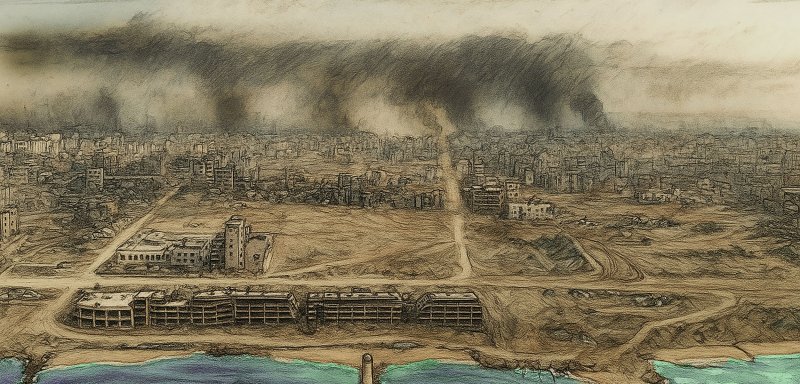I was just starting university when the genocide began. Education was immediately suspended. The Strip went blackout, making life extremely difficult and snatching away any sense of security. For two years, our tents have served as roofs. With each passing day, something else is taken from us. We have spent the past two years living in a closed loop of cruelty and uncertainty.
Gaza today is unrecognizable. Its exhausted residents continue to face a life of displacement and deprivation, all under a suffocating blockade that shows no sign of ending.
Our lives remain a daily struggle: searching for a place to charge our phones, finding a signal for a few hours on the Internet to continue our studies, or simply reassuring others and telling ourselves that we are still alive.
I remember stepping outside of my home in the early days; I saw children crying in the streets, unsure whether to go back home or continue on their way to school. Khalil, a fourth-grade student, who led the school assembly and recited the Qur’an aloud because of his beautiful voice, was missing. Abu Khalil, his father, told me that his son could not take the sound of the bombardment, and that he had been injured by shrapnel in his foot during the last war. We spent the day searching for him, his father’s desperate plea echoing across the city. He wasn’t alone; dozens of parents were also looking for their children. We stumbled upon children everywhere and tried to put them in contact with their parents, to reassure both of them that the others were alive. We later found Khalil sitting with others who were comforting and reassuring him. When I returned home that day, my father told me never to leave the house unless absolutely necessary.
From that moment on, schooling in Gaza came to a halt. Over 625,000 students have been deprived of their right to education since the war began. Schools and classrooms have been converted into shelters and evacuation centers, turning education into a distant dream amidst another cycle of war and displacement for Palestinians.
My life began to change, from the Hassan who woke up early to attend university lectures, to the Hassan who now wakes up at dawn to stand in bread lines.
On 28 October, the face of our neighborhood began to change. Everybody was busying themselves buying groceries and charging their phones. Suddenly, we heard two airstrikes heading toward us. All the windows in our house shattered, and I nearly choked at the eruption of dust and smoke. I couldn’t hear my mother in the next room, so I shouted after her; she had been injured by shards of broken glass, but she was okay. I heard neighbors screaming where we were charging our devices using solar panels. I ran out to the street and saw my friends, who were gathered around their phones only minutes ago, martyred in front of me, scenes of destruction and blood everywhere. The neighborhood came together to move the wounded, but heard someone calling from under the rubble. Emergency teams managed to rescue Salman, who had lost his mother and siblings, and suffered injuries to his leg and back. His father survived; it was now just the two of them.
My father also went missing that day. He had miraculously survived the strikes due to a faulty car, which had spared him his life. That day, we lost the people we grew up with; friends, family, loved ones. Homes were destroyed, its residents gone, and devastation everywhere. My life began to change: from the Hassan who woke up early to attend university lectures to the Hassan who now wakes up at dawn to stand in bread lines.
By February 2024, I had completely forgotten about my birthday. “You’ve grown a year older," my mother said, smiling. “Just a year,” I responded. We shared a small treat together, a moment of warmth and a ray of safety amid the hardship and terror. As if life, despite everything, would still give us the chance to catch our breath and remember that we are human.
Two years of repeated disasters. Two years of suffering. Our lives remain a daily struggle: searching for a place to charge our phones, finding a signal for a few hours on the Internet to continue our studies, or simply reassuring others and telling ourselves that we are still alive.
Gaza remains under occupation, trapped by silence and neglect, without safety or freedom of movement, with less than half of its original area still considered livable. But two years on, Israel’s massacres have not broken our spirit. Even under the missiles, the bombs, and the drones, we continue to learn, write, and resist. We’re not numbers or tales, but living testimonies that life goes on; that, two years on, we remain on this land, our land. We know the sun will shine on us again.
Raseef22 is a not for profit entity. Our focus is on quality journalism. Every contribution to the NasRaseef membership goes directly towards journalism production. We stand independent, not accepting corporate sponsorships, sponsored content or political funding.
Support our mission to keep Raseef22 available to all readers by clicking here!
Interested in writing with us? Check our pitch process here!





